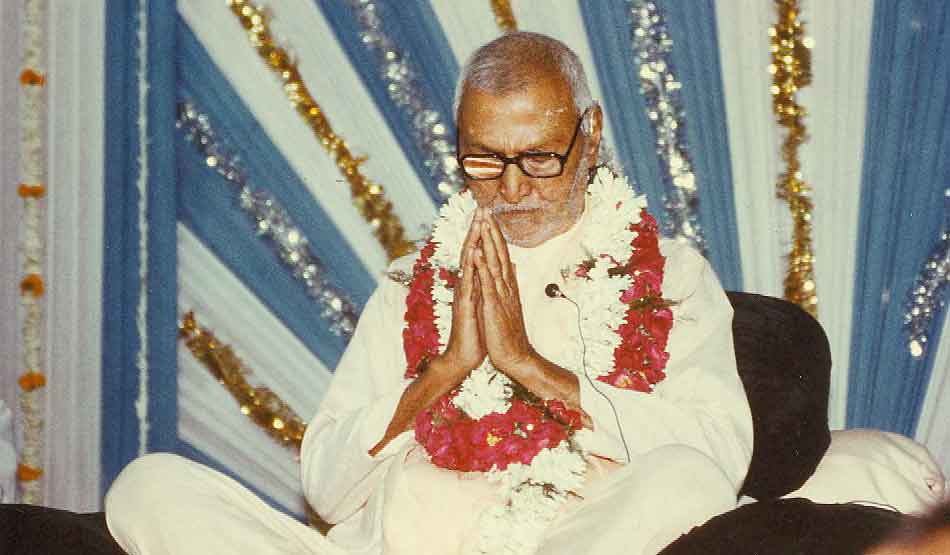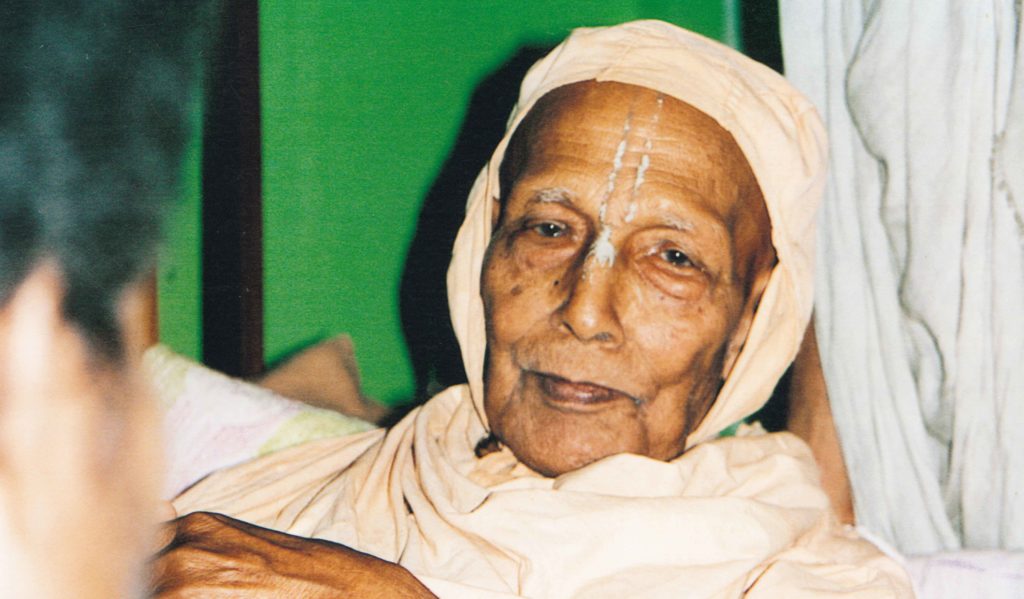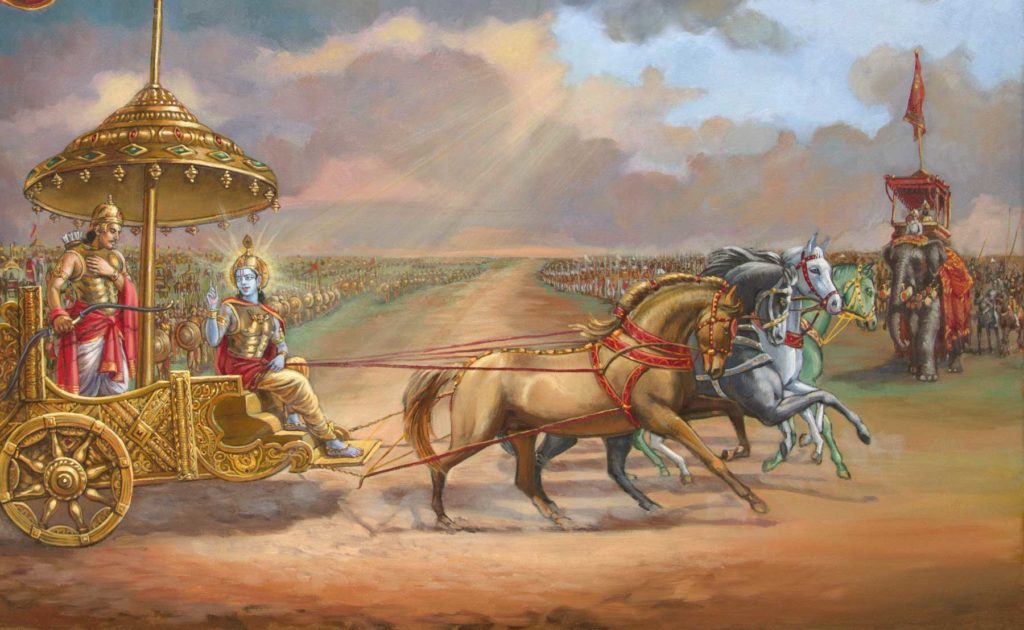Overview
On the occasion of the disappearance of His Divine Grace Śrīla Bhakti Rakṣaka Śrīdhara Deva Gosvāmī Mahārāja, we present the following article that was originally written by Śrīla Narasiṅgha Mahārāja for the publication, "Encounters With Divinity."
One can easily understand the greatness of an individual by the acts he performs or by the contributions that he makes to society. The glories of Śrīla Śrīdhara Mahārāja are many and they are all deep like an ocean of transcendental nectar.
Śrīla Śrīdhara Mahārāja was not a mundane welfare worker that sought to uplift the bodily condition of a fallen man or that of many fallen and diseased men. Quite to the contrary – the contribution of Śrīla Śrīdhara Mahārāja was to uplift all of humanity to the spiritual platform of Kṛṣṇa consciousness, a rare contribution indeed.
The words of Śrīla Śrīdhara Mahārāja, both on audio tapes and in book format, are perhaps one of the greatest theological treasures of the 20th Century. When the transcendental vibration from his lips enters the heart of a sincere seeker of truth, one immediately feels the fulfilment of the innermost hankering of the heart – we want Kṛṣṇa and nothing else.
To compile the complete list of Śrīla Śrīdhara Mahārāja’s glories is not possible, but to speak of some of them in terms of what he has said and what he has written is a purifying, and an enlightening experience.
Śrī Śrī Prabhupāda-padma Stavaka
Śrī Śrī Prabhupāda-padma Stavaka is a song of eleven verses composed by Śrīla Śrīdhara Mahārāja that eulogizes the transcendental personality of Śrīla Bhaktisiddhānta Sarasvatī Ṭhākura Prabhupāda. This song is so revered and appreciated by the disciples and grand-disciples of Sarasvatī Ṭhākura that it is sung daily in virtually all the Gauḍīya Maṭhas.
The concluding line to each of the eleven stanzas, praṇamāmi sadā prabhupāda-padam (I eternally offer my obeisances to that wonderful effulgence that emanates from the radiant lotus toetips of Śrīla Bhaktisiddhānta Sarasvatī Ṭhākura Prabhupāda) is so sweet that it has become the hallmark of remembering that great ācārya of the Gauḍīya firmament.
Śrīmad Bhaktivinoda-viraha Dāsakam
The ten verses of Bhaktivinoda-viraha Dāsakam (expressing deep separation from Śrīla Bhaktivinoda Ṭhākura) were greatly appreciated by Śrīla Bhaktisiddhānta Sarasvatī Ṭhākura Prabhupāda who commented that, “Śrīdhara Mahārāja has caused Ṭhākura Bhaktivinoda to appear in those verses.”
One of the favourites of the Bhaktivinoda-viraha Dāsakam is the ninth verse that represents the ontological line of the inner substance of Kṛṣṇa consciousness:
“What was sanctioned by Śrī Caitanya Mahaprabhu by His descent, was intimately known only to Śrī Svarūpa Dāmodara Gosvāmī. Sanātana Gosvāmī, the elder brother of Śrī Rūpa Gosvāmī, was attentive to that divine truth, and Rūpa Gosvāmī himself served that very thing with his own hands to the devotees. Raghunātha Dāsa Gosvāmī tasted its sweetness and also added something of his own to its flavour. (He was assisted in doing so by Raghunātha Bhaṭṭa Gosvāmī and Gopāla Bhaṭṭa Gosvāmī.) What was distributed and tasted by Raghunātha Dāsa was protected by Śrī Jīva Gosvāmī, who lent support to its divinity with scriptural evidence. The taste of that divine truth is aspired after by Śrī Śukadeva Gosvāmī, Lord Śiva, and Lord Brahmā who regard it from a little distance with the highest respect. What is that inconceivable ambrosia? The sublime sweet nectar of the mellows relished in the service of Śrīmatī Rādhārāṇī’s holy lotus feet. O Bhaktivinoda Ṭhākura, within this world, you fully possess the ability to give us that extraordinary nectar.”
Śrī Śrī Prema-dhāma-deva Stotram
Śrī Śrī Prema-dhāma-deva Stotram is a concise description of the līlā of Śrī Caitanya Mahaprabhu composed in the Sanskrit tūṇaka metre that represents the dancing rhythm of spiritual delight. The verses of Prema-dhāma-deva Stotram are based on Caitanya-caritāmṛta and other authorised writings about Śrī Caitanya. It describes Śrī Caitanya as Śrī Kṛṣṇa, the Supreme Personality of Divine Truth, permeated with the mood (bhāva) and complexion (kānti) of His supreme pleasure potency, Śrīmatī Rādhārāṇī. Śrī Caitanya is portrayed as the unlimited ocean of ecstatic love of Kṛṣṇa.
This stotra describes some of the most predominant aspects of Śrī Caitanya’s divine personality. His transcendental characteristics (aprākṛta-vaiśiṣṭa), qualities (guṇa), beauty (rūpa), charm (akarṣana), compassion (karuṇa), generosity (audārya), power (tejas), forgiving nature (kṣamā-śīlatā), magnanimity (mahattva), wisdom (prajñāna), conviction (viśvāsa), determination (dṛdha-saṅkalpatā), self-contentment in ecstatic love for Kṛṣṇa (svānubhāvānanda), all-encompassing kind love for others (sarva-jīve dayā), limitless ecstatic love for Kṛṣṇa (kṛṣṇa-prema-dhāma-rūpa), and His compassionate sharing of that divine love ecstasy with others (mahā-vadanya-kṛṣṇa-prema-pradātṛtvā).
Prema-dhāma-deva Stotram is highly regarded for its siddhāntika content and especially for its mellow sweetness that transports the listener to the realm of loving devotional service of Śrī Caitanya Mahāprabhu. Paramahaṁsa Śrī Niṣkiñcana Kṛṣṇa Dāsa Bābājī Mahārāja, a dear friend and godbrother of Śrīla Śrīdhara Mahārāja, used to say of this stotra that he found in it the very presence of Śrī Rūpa Gosvāmī Prabhupāda, the leader of our sampradāya.
Śrī Śrī Prapanna-jīvanāmṛtam
Śrī Śrī Prapanna-jīvanāmṛtam is, as the title indicates, the life nectar of the surrendered souls and leads its readers to positive and progressive immortality. Śrīla Śrīdhara Mahārāja’s introduction reads as follows:
“The substance expressed within the ten chapters of this holy book called Prapanna-jīvanāmṛtam gives life to the surrendered souls, effecting their eternal growth and nourishment. It is the panacea of the heart and spiritual senses, bestowing those dedicated devotees with mutual happiness by the ever-increasingly newer and newer play of supra-mundane joy (aprākṛta-rasa). Lord Kṛṣṇa and His associates are portrayed in their natural pastimes of separation and union, and the line of unconditional surrender as established by scriptures and saints has been elucidated.”
The doctrine of śaraṇāgati (surrender) is at the heart of Gauḍīya Vaiṣṇavism – indeed, it is the indispensable necessity in the life of a devotee. In Prapanna-jīvanāmṛtam, Śrīla Śrīdhara Mahārāja has complied an anthology of verses in the chapter Words of Nectar from the Devotees, delineating the six processes of surrender. Here the processes of ānukūlyasya saṅkalpa (acceptance of the favourable), prātikūla-vivarjjanam (rejection of the unfavourable), rakṣiṣyatīti viśvāsaḥ (confidence in the Lord’s protection), goptṛtve-varaṇam (embracing the Lord’s guardianship), ātma-nikṣepad (full surrender), and kārpanyam (surrender in humility) are illuminated. Prapanna-jīvanāmṛtam also includes the chapter Words of Nectar from the Supreme Lord. Śrīla Śrīdhara Mahārāja says:
“Herein, collected from the holy scriptures headed by Śrīmad Bhāgavatam and Bhagavad-gītā, are words of nectar directly from the lotus mouth of the Supreme Personality of Godhead. This is the nectar to vanquish all sorrow and darkness for the souls surrendered to the lotus feet of Śrī Kṛṣṇa, and also for those aspiring for exclusive love for Kṛṣṇa. It nourishes the lives of the devotees, pleasing their hearts by fulfilling all their cherished desires for devotional service.”
Concluding Prapanna-jīvanāmṛtam, Śrīla Śrīdhara Mahārāja writes, “Comprised of five nectars (pañcāmṛtam) respectively entitled Upakramāmṛtam, Śrī Śāstra-vacanāmṛtam, Śrī Bhakta-vacanāmṛtam, Śrī Bhagavad-vacanāmṛtam, and Avaśeṣāmṛtam (Prelude to Approaching Nectar, the Nectar of Scriptural Words, Words of Nectar from the Devotees, Words of Nectar from the Supreme Lord, and the Remnants of Nectar), the supreme fruit that gives life to the devotees and delights their hearts has been served in this book.”
Śrī Śrī Gāyatrī-nigūḍhārtha
Garuḍa Purāṇa states:
artho’yaṁ brahma-sūtrāṇāṁ bhāratārtha-vinirṇayaḥ
gāyatrī-bhāṣya-rūpo’sau vedārtha-paribṛṁhitaḥ
“The meaning of the Vedānta-sūtra is present in Śrīmad Bhāgavatam. The full purport of the Mahābhārata is also there. The commentary of the brahma-gāyatrī is also there and fully expanded with all Vedic knowledge.”
In his Sanskrit commentary on brahma-gāyatrī (Śrī Gāyatrī-nigūḍhārtha), Śrīla Śrīdhara Mahārāja has uncovered the steps leading the gāyatrī-mantra to the Śrīmad Bhāgavatam. The conclusion is:
gāyatrī-muralīṣṭa-kīrtana-dhanaṁ rādhā-padaṁ dhīmahi
“The gāyatrī, that has sprung from the flute sound of Śrī Kṛṣṇa, only sings the glories of Śrīmatī Rādhārāṇī.”
gāyatrī-gaditaṁ mahāprabhu-mataṁ rādhā-padaṁ dhīmahi
“The highest and innermost instruction of Śrī Caitanya Mahāprabhu is to engage yourself in the service of the lotus feet of Śrīmatī Rādhārāṇī through saṅkīrtana. Her lotus feet are to be your constant meditation.”
Regarding the Gāyatrī-nigūḍhartha of Śrīla Śrīdhara Mahārāja, Śrīla Bhakti Pramoda Purī Gosvāmī has said:
“The explanation of brahma-gāyatrī, the mother of all Vedas, signifying devotional worship unto Śrīmatī Rādhārāṇī, śrī-rādhānudhyāna-para explanation, which was revealed in the depth of realization of Pūjyapāda Śrīdhara Deva Gosvāmī Mahārāja, possessed with the divine grace of Paramārādhya Śrī Śrīla Prabhupāda (Bhaktisiddhānta Sarasvatī Ṭhākura) upon his head, is deeply appreciated by those fortunate, intelligent devotees who are aware of the relishable beauty of pure devotional service.”
Upon the transcendental appearance of Śrī Gāyatrī–nigūḍhartha from the pure heart of Śrīla Śrīdhara Mahārāja the Vaiṣṇava world of pure devotees rejoiced and danced in great ecstasy.
The Guardian of Devotion
The sannyāsa title of Śrīla Śrīdhara Mahārāja ‘Bhakti Rakṣaka’ means the Guardian of Devotion and this is something that Śrīla Śrīdhara Mahārāja lived up to in every sense of the word. From our personal experience we can honestly say that were it not for the presence of Śrīla Śrīdhara Mahārāja (after the disappearance of our Guru Mahārāja, Śrīla A.C. Bhaktivedānta Svāmī Prabhupāda) all would have been lost in darkness forever.
After the disappearance of Śrīla Prabhupāda, many misunderstandings and deceitful practices crept in amongst our Guru Mahārāja’s disciples. At a time of great unrest and confusion, Śrīla Śrīdhara Mahārāja manifested before our eyes as the Guardian of Devotion and guided the devotees on the path to their greatest fortune.
As the keeper of the storehouse of life’s greatest treasure, Śrīla Śrīdhara Mahārāja shared with us the unlimited wealth of Kṛṣṇa consciousness and manifested before us many self-effulgent gems (unrivalled conceptions of Gauḍīya siddhānta) to which he was heir. Many of those gems of theological conception have been presented in his books and have in time become sūtras (simple phrases with a deep philosophical purport) in the English language. Some of those sūtras are: The Search for Śrī Kṛṣṇa – Reality the Beautiful (the ultimate goal of life), rādhā-dāsyam (the service of Śrī Rādhā), The Line of Śrī Rūpa, (the ontological position of Śrī Rūpa Gosvāmī), The Golden Volcano of Divine Love (the ecstatic manifestation of Śrī Caitanya Mahāprabhu as the giver of love of Kṛṣṇa), The Loving Search for the Lost Servant (Kṛṣṇa’s loving search for His long lost servant), and pūjala-rāga-patha gaurava-bhaṅge (the motto of the followers of Śrīla Bhaktisiddhānta Sarasvatī Ṭhākura Prabhupāda that put forward the position to be taken by a devotee in the relativity of the Absolute).
Śrīmad Rūpa-pāda-rajaḥ Prārthanā-Daśakam
Just prior to the withdrawal of his manifest līlā, Śrīla Bhaktisiddhānta Sarasvatī Ṭhākura Prabhupāda handed Śrīla Śrīdhara Mahārāja over to the holy lotus feet of Śrī Rūpa Gosvāmī by having him sing the prayer Śrī Rūpa-mañjarī-pada. The ontological position of Śrīla Śrīdhara Mahārāja became that of the storehouse keeper of life’s greatest gift, that of the position of the servant, of the servant’s servant, servant in the camp of Śrī Rūpa Mañjarī (śrī-rūpānuga-varga). His intense desire for the dust of the lotus feet of Śrī Rupa Gosvāmī is beautifully expressed in his prayer, Śrīmad Rūpa-pāda-rajaḥ Prārthanā-Daśakam.
Śrīla Śrīdhara Mahārāja humbly considered himself as a gatekeeper of the highest conception of Śrī rūpānuga-bhajana and endeavoured unwaveringly throughout his life to be faithful to the ideal and teachings of his Divine Master, Śrīla Bhaktisiddhānta Sarasvatī Ṭhākura Prabhupāda.
Prema Dhāma Deva Stotram with the Narasiṅgha Sevaka Commentary – Verses 61-65
In verses 61 to 65 of 'Prema Dhāma Deva Stotram', Śrīla Śrīdhara Mahārāja narrates the pastime of Śrī Caitanya at Caṭaka Parvata In Purī and explains how the scriptures produced by Brahmā and Śiva are ultimately searching for the personality of Mahāprabhu who is merciful too all jīvas, no matter what their social position.
Prabhupāda Śrīla Sarasvatī Ṭhākura’s Visit to Ayodhyā
With the forthcoming observance of Śrī Rāma Navamī, we present 'Prabhupāda Śrīla Sarasvatī Ṭhākura’s Visit to Ayodhyā' written by Śrīla Bhaktisiddhānta Sarasvatī Ṭhākura Prabhupāda from The Gaudīyā magazine, Vol 3. Issue 21/ In December 1924, after visiting Benares and Prāyāga, Sarasvatī Ṭhākura visited the birth-site of Śrī Rāmācandra in Ayodhyā.
Śaraṇāgati – The Only Path to Auspiciousness
In this article, 'Śaraṇāgati - The Only Path to Auspiciousness', Dhīra Lalitā Dāsī analyses the process of śaraṇāgati (surrender) beginning with śraddhā (faith). She also discusses the role of śāstra and the Vaiṣṇava in connection with surrender.
Ātma Samīkṣā – The Value of Introspection
In this article, "Ātma Samīkṣā – The Value of Introspection" Kalki Dāsa highlights the importance of introspection in the life of a devotee and especially in relation to the worldly environment that surrounds us. He also explains how transcendental sound influences our capacity to introspect.
Prema Dhāma Deva Stotram with the Narasiṅgha Sevaka Commentary – Verses 61-65
In verses 61 to 65 of 'Prema Dhāma Deva Stotram', Śrīla Śrīdhara Mahārāja narrates the pastime of Śrī Caitanya at Caṭaka Parvata In Purī and explains how the scriptures produced by Brahmā and Śiva are ultimately searching for the personality of Mahāprabhu who is merciful too all jīvas, no matter what their social position.
Prabhupāda Śrīla Sarasvatī Ṭhākura’s Visit to Ayodhyā
With the forthcoming observance of Śrī Rāma Navamī, we present 'Prabhupāda Śrīla Sarasvatī Ṭhākura’s Visit to Ayodhyā' written by Śrīla Bhaktisiddhānta Sarasvatī Ṭhākura Prabhupāda from The Gaudīyā magazine, Vol 3. Issue 21/ In December 1924, after visiting Benares and Prāyāga, Sarasvatī Ṭhākura visited the birth-site of Śrī Rāmācandra in Ayodhyā.
Śaraṇāgati – The Only Path to Auspiciousness
In this article, 'Śaraṇāgati - The Only Path to Auspiciousness', Dhīra Lalitā Dāsī analyses the process of śaraṇāgati (surrender) beginning with śraddhā (faith). She also discusses the role of śāstra and the Vaiṣṇava in connection with surrender.
Ātma Samīkṣā – The Value of Introspection
In this article, "Ātma Samīkṣā – The Value of Introspection" Kalki Dāsa highlights the importance of introspection in the life of a devotee and especially in relation to the worldly environment that surrounds us. He also explains how transcendental sound influences our capacity to introspect.








